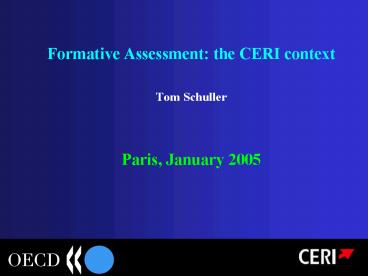Formative Assessment: the CERI context - PowerPoint PPT Presentation
1 / 11
Title:
Formative Assessment: the CERI context
Description:
To enrich international knowledge and understanding of trends and issues in ... Promoting research and policy debate through publications, electronic discussion ... – PowerPoint PPT presentation
Number of Views:21
Avg rating:3.0/5.0
Title: Formative Assessment: the CERI context
1
- Formative Assessment the CERI context
- Tom Schuller
- Paris, January 2005
2
Directorate For Financial Fiscal and Enterprise
Affairs
Directorate for Employment Labour and Social
Affairs
Trade Directorate
Economics Department
Directorate for Education
COUNCIL
Directorate for Public Management and
Territorial Development
SECRETARIAT
Centre for Educational Research and
Innovation (CERI)
COMMITTEES
Statistics Directorate
Directorate for Food Agriculture and Fisheries
Environment Directorate
Directorate for Science Technology and Industry
Development Co-operation Directorate
3
Education andTraining PolicyDivision
Indicators andAnalysisDivision
DirectorateforEducation
IMHE/PEB
Centre forEducationResearch andInnovation
4
CERIs goals
- To enrich international knowledge and
understanding of trends and issues in lifelong
learning, ie across all sectors and modes - To encourage better links between research,
policy innovation and practice.
5
We do this by
- Promoting research and policy debate through
publications, electronic discussion and
conferences. - Carrying out studies of key educational issues,
using a combination of our own staff and outside
experts from around the world. - Developing tools, indicators and frameworks for
international analyses of education systems and
practices.
6
Our programme
- Lifelong learning provides the overarching
context. Within that our key themes are
- Innovation and knowledge management.
- Human and social capital.
- A futures focus.
- Learning and teaching.
7
OECD/CERI contextual factors
- Growing preoccupation with outcomes, as well as
inputs and participation rates outcomes are more
than qualifications achieved. - The returns to education cannot be understood in
terms of individual performance alone - CERI interest in evidence and in causal
mechanisms. - Data availability and appropriate measurement
the need for mixed methodologies
8
EDU/CERI related projects
- PISA
- Teachers
- Schooling for Tomorrow/University Futures what
works in futures thinking - Learning Science the brain project effective
learning at different points in the lifecourse - Evidence-based Policy Research matching methods
to issues
9
Key issues
- Asking the right questions relevant, significant
and (partly) answerable - Maintaining trust valuing experience, but
combined with accountability - Accumulating evidence including on evidence
10
Conference goals
- Share, examine and extend the findings of the
CERI study - Critique/confirm the model and the evidence
- Scaling up how to implement FA on wider basis
- Link to next WW study, on adult basic skills
11
- It is hardly possible to over-rate the value
.of placing human beings in contact with persons
dissimilar to themselves, and with modes of
thought and action unlike those with which they
are familiarSuch communication has always been,
and is peculiarly in the present age, one of the
primary sources of progress. - JS Mill, Principles of Political Economy































